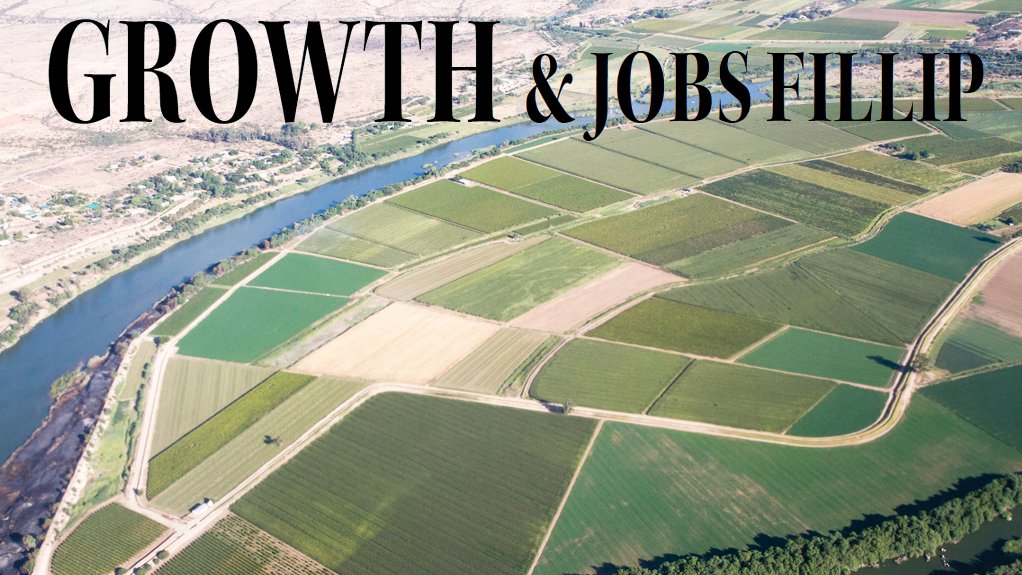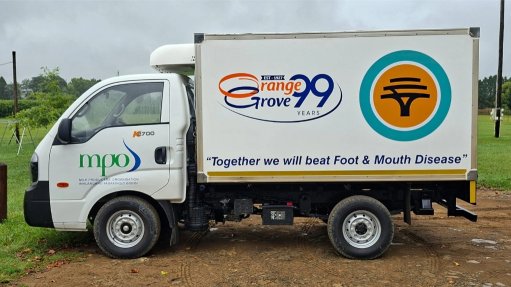Agribusiness push continues as govt seeks to bolster economic growth, job creation





MUSTAQ AHMED BREY Brimstone is bullish when it comes to government’s aspirations for the country’s agroprocessing sector
GUGILE NKWINTI Recently presented an action plan to speed up land reform and stimulate the rural economy
Photo by Duane Daws
NHLANHLA NENE Agriculture is one of the less energy-intesive sectors within which the best short-term prospects for faster growth lie
Photo by Duane Daws
Government continues to stress the importance of the agroprocessing agenda in an attempt to bolster economic growth and job creation, while also securing South Africa’s future food requirements in an economy that fell short of its growth target in 2014, achieving only 1.5%, after initially being forecast to grow by 3.2% by the World Bank.
To revitalise agriculture, government plans to progressively establish Agri-Parks in all 53 of South Africa’s district municipalities.
This emerged at an Economic Sectors, Employment and Infrastructure Development Cluster media briefing chaired by Rural Development and Land Reform Minister Gugile Nkwinti in February, where an action plan for the 2015/16 financial year was presented to speed up land reform and stimulate the rural economy.
Government has set aside R2-billion for the 2015/16 financial year, during which it intends to prioritise the 27 poorest district municipalities, with an interdepartmental task team, including organised agriculture, said to have already started work on plans to implement the programme.
“These [Agri-Parks] will be fully fledged agrohubs that will offer all services along the various commodity value chains. This ‘One District, One Agri-Park’ and ‘Every Municipality a [Comprehensive Rural Development Programme] Site’ approach will include the selection and training of smallholder farmers in partnership with District Land Reform Committees,” Nkwinti explained.
Government also intends enforcing a 30% local procurement programme, fast-tracking the provision of ‘set-asides’ for strategic agricultural commodities and developing a “robust” import-replacement strategy this year.
Further, the 50:50 Policy Framework, which aims to promote the rights of people working and living on the property of commercial farmers, will be implemented immediately. “Government has received a number of proposals from commercial farmers and will pilot at least 50 projects during this term,” Nkwinti advised.
The Minister also highlighted the prohibition of future foreign ownership of agricultural land, but hastened to add that foreign nationals would be eligible for long-term leases with a minimum 30-year tenure. This policy did not apply to resi- dential property.
Further, Nkwinti noted that the Regulation of Land Holdings Bill, which will place a ceiling of 12 000 ha on agricultural land that can be owned by legal and natural persons, should be processed through Parliament and signed into law this year.
Gauteng’s Role
At the inaugural Gauteng Agroprocessing Summit, in Kliptown, Soweto, earlier this month, Gauteng Premier David Makhura explained that the event was intended to help position Gauteng as the agroprocessing hub of South Africa and the whole of Africa.
“Given that Gauteng occupies only 1.4% of our country’s total land mass, our focus must deliberately shift to agroprocessing,” he emphasised at the two-day summit, adding that the province’s Southern and Western Development Corridors (Sedibeng and the West Rand) had been identified as Gauteng’s agricultural hub.
He noted that agriculture currently contributed 0.4% to Gauteng’s gross domestic product.
“However, when taking into account the forward and backward linkages in areas such as dairy products, biofuels and essential oils, grain and bakery products, wineries, breweries and distillers, meat, textiles, beverages, and wood and furniture, as well as hides and leather, agriculture contributes about 36% to Gauteng’s economy,” Makhura said.
The Gauteng summit was intended to help the province take decisive action to transform, modernise and reindustrialise the Gauteng city region through, among others, unlocking the full potential of agroprocessing and agribusiness.
“As part of taking forward the [National Devel- opment Plan], the Agricultural Policy Action Plan (Apap) and the Industrial Policy Action Plan (Ipap), the summit must help us increase the contribution of agriculture to the provincial economy by strengthening our focus on value-add to primary agricultural products,” Makhura said.
He added that efforts also needed to result in the emergence of sustainable black enterprises and black industrialists in the agriculture and agroprocessing sector, while black farmers needed to play a meaningful role in the entire agricultural value chain.
On the second day of the summit, Trade and Industry Deputy Minister Mzwandile Masina said agroprocessing was a capital-intensive sector that could be used by government to change the current outlook of South Africa’s negative trade balance.
The summit, which was attended by more than 500 smallholder and commercial farmers, food retail companies and financial institutions, was the culmination of workshops conducted by the Gauteng Department of Agriculture and Rural Development to solicit inputs from stakeholders into the drafting of the Gauteng Agroprocessing Strategy. It also aimed to focus on ways for government to explore to unlock the full potential of agroprocessing in the province.
Masina stressed that the agroprocessing sector had massive potential for growth, noting that this potential required choices to be made, in particular, industrial policy, which could draw an array of players into the economy.
In line with this, the Department of Trade and Industry was engaged in a policy process for the development of industrial players from historically marginalised sections of society.
With the development of Ipap, Trade and Industry Minister Dr Rob Davies noted in October that his department had injected about R1.2-billion into the agroprocessing industry since 2009.
National Importance of Sector Stressed
In his 2015 Budget speech, Finance Minister Nhlanhla Nene noted that agriculture was one of the less energy-intensive sectors within which the best short-term prospects for faster growth lay, stressing that efforts to support this sector had to be intensified.
He noted that part of the 2015 Budget was aimed at promoting agriculture and agroprocessing, adding that, in agriculture, there was investment and export growth in horticultural products such as grapes, citrus and tree nuts.
Prior to the Budget, during his State of the Nation address in February, President Jacob Zuma listed the revitalisation of the agriculture and agroprocessing value chain under government’s nine-point plan to ignite economic growth.
The President said government would continue to strengthen support for agricultural development and trade under Agriculture, Forestry and Fisheries Minister Senzeni Zokwana, noting that the projected conditional allocation to provinces over the medium term was R7-billion, while access to finance by emerging farmers would be expanded, in collaboration with the Land Bank.
Private-Sector Member Activity
Meanwhile, in his Budget speech, Nene reiterated the Industrial Development Corporation’s (IDC’s) plan to invest R100-billion over the next five years to promote faster industrial development, mineral beneficiation and agroprocessing.
The IDC notes that most of this investment will be in partnership with private-sector investors.
Brimstone Investment Corporation CEO Mustaq Ahmed Brey emphasises that it is a requirement for all countries to make it easier for people to invest in the agroprocessing industry, otherwise the world would face a food problem, which, he says, is already prevalent.
“It is a [incumbent] on us to ensure that [agroprocessing is more greatly] supported and more food is produced,” he tells Engineering News.
The JSE-listed company continues to derive value from the food sector through its investments, reporting a total asset increase of R1.1-billion to R7.9-billion for the year ended December 31, with investments in the food sector contributing 40% of the company’s intrinsic gross asset value.
Brey states that Brimstone is bullish when it comes to government’s aspirations for the country’s agroprocessing sector in terms of job creation, highlighting an initiative by fishing and commercial cold storage company Oceana, which has seen it expand its freezer room facilities at its canning factory in St Helana Bay, in the Western Cape, to ensure that, when there is no fish, its staff has at least two days of work a week.
Brimstone started with R3-million in shareholder equity and a R4.5-million loan, which was used to buy into Oceana in 1995.
Currently, Brimstone owns a 16.81% share in Oceana, which accounts for 26% of Brimstone’s intrinsic gross asset value.
Brimstone also owns 58.44% of Sea Harvest, which it initially bought into in 1998. The fishing company, dependent on government allocated fishing rights, has expanded its fleet with the R130-million acquisition of a new vessel, Harvest Atlantic Peace. The new vessel, built in Norway in the Sterkoder AS yard, was launched at the V&A Waterfront, in Cape Town, in October.
The fishing trawler includes an on-board factory and has the capacity to catch and process 6 500 to 7 000 green-weight tons of Cape Hake a year and freeze 40 t/d of the fish. The vessel, with a crew of 60, is at sea for 30 to 40 days.
Brimstone also has a 0.94% share in packaged goods company Tiger Brands.
Tiger has implemented various initiatives, which complement local beneficiation, the creation of sustainable value chains and creating forward and backward linkages.
In terms of the procurement of small white beans for Koo and Hugo’s baked beans in tomato sauce, the company notes that more than 80% of the quantity needed is now grown and processed in South Africa. This is due to interventions by Tiger, which include working with primary processors who, in turn, work with farmers, more production under irrigation, the introduction of different planting dates and new cultivated areas of South Africa, investment in new cultivars and the use of harvesting and primary processing technology that was available overseas.
As of 2008/9, more than 50% of the white beans needed were imported. All Koo and Hugo’s final canned product is produced in South Africa.
Tiger has also intervened with regard to local peanut farming for the manufacturing of Black Cat peanut butter. Although sufficient quantities of peanuts were previously available in South Africa in most years, the quality of these peanuts were not in line with the company’s quality standards.
“[As a result] Tiger worked together with suppliers over a period of time when new technology was introduced in the harvesting and storage of peanuts. Technical teams supported the local suppliers and tests took place on the acceptance of new cultivars. Both the quantity and quality of peanuts received from the local industry now satisfy the needs for Black Cat peanut butter.”
Besides Tiger’s Boksburg, Johannesburg-based manufacturing units, in the Western Cape, its Culinary division includes a jam unit, in Paarl, a mayonnaise unit, in Bellville – which is due to close end-March/mid-April when the factory relocates to Boksburg, in Gauteng, to be closer to the market and South Africa’s sunflower growing area – and a tomato paste unit, in Lutzville.
With regard to the company’s jam unit, black economic-empowerment (BEE) development has not been fully tapped into yet owing mostly to the specialised nature of production; however, Tiger says there is potential “to an extent”.
The BEE potential of areas servicing its Lutzville tomato paste unit has, as yet, not been fully tapped into. The unit, on average, has a producer base of 60, which includes commercial tomato farmers, wine farmers supplying intermittent volumes and BEE farmers stretching from Trawal in the south, Vredendal in the east and Koekenaap and/or Ebenhaeser in the west. The producer base covers about 2 000 km2 in the north-western part of the Western Cape.
The unit requires about 35 000 t of fresh tomatoes and has a comfortable average supply capacity of about 37 000 t/y; however, the main determinants of this capacity are the availability of produce from intermittent wine farmers and water supply from the Clanwilliam dam irrigation scheme, on the lower Olifants river.
With regard to Tiger’s tomato unit, in Musina, Limpopo, most vegetables are procured from the company’s vegetable unit, in Marble Hall, Mpumalanga, which also supplies Tiger’s factories in Boksburg.
The Musina unit has a producer base of 120 farmers, with the biggest portion of its average 65 000 t supply produced along the Limpopo river, with most BEE producers situated in the Nwanedi (Venda) area.
“The BEE base is quite strong at this stage, but there is further potential given business involvement in enterprise development. The production of the Chakalaka range of products also requires substantial volumes of cabbage, onions, carrots, brinjals and chillies to be procured every year,” explains Tiger, adding that the production of tomato paste from both Lutzville and Musina is linked to All Gold tomato sauce production at the company’s Boksburg factory.
Meanwhile, to further reduce its exposure to imports, Darsot Food Corporation, the controlling shareholder of AH-Vest, has acquired a tomato-processing factory in Duiwelskloof, Tzaneen, Limpopo, from Tiger.
AH-Vest, which produces All Joy products, explains that South Africa has been experiencing a major shortage of tomato paste over an extended period and, as a result, its brands, Dursots and All Joy, have had to rely on imported products.
A key objective of Dursots and All Joy, which are committed to procuring all ingredients in South Africa, is also to increase local raw materials from 80% to 95% to further reduce exposure to imports.
In a telephone interview with Engineering News, AH-Vest CEO Ismail Darsot explained that the company was busy upgrading the tomato-paste plant, installing an aseptic packaging line with a sterilisation plant and upgrading all the auxiliary equipment required for the processing of tomatoes.
Once the plant has been commissioned, the capacity will be 600 t/d. The facility is currently nonoperational, with the start of production scheduled for June 1.
As of March 1, Darsot Food officially moved its All Joy tomato sauce processing and bottling factory from Tarlton, in the North West, to a R55-million facility at is hub in Eikenhoff, Johannesburg, Gauteng.
The factory is 25 years old and the new factory is four times the size. Once all the lines are operational, the facility is expected to produce about 50-million units a year.
“We have five production lines in the canning factory and are increasing this to ten production lines,” states Darsot, noting that the expansions have led to an increase in staff, but were not necessarily driven by government’s emphasis on the agroprocessing sector, but rather an increase in demand across South Africa and from its neighbouring countries and certain other African countries.
Government Planning
Government’s Ipap, which was first launched in the 2007/8 financial year, identifies agroprocessing as a vehicle for value- addition to the country’s agricultural products, thereby assisting economic growth and the creation of job opportunities. The potential of the sector is also highlighted in the New Growth Path and the NDP.
Aligned with the NDP’s target of creating one-million agriculture- sector jobs by 2030 is Apap, which was approved by Cabinet this month.
Apap seeks to provide both a long-term vision and focused interventions in a five-year rolling schedule, to be updated every year.
Similar to Ipap, Apap is based on sectoral and transversal key action programmes, while for each of the identified commodities, the plan includes a problem statement, aspirations, policy levers, the nature of interventions and key outputs.
The action plan includes sectoral key action plans for biofuels, fruit and vegetables, red meat, wheat and poultry, as well as the wine industry.
Article Enquiry
Email Article
Save Article
Feedback
To advertise email advertising@creamermedia.co.za or click here
Announcements
What's On
Subscribe to improve your user experience...
Option 1 (equivalent of R125 a month):
Receive a weekly copy of Creamer Media's Engineering News & Mining Weekly magazine
(print copy for those in South Africa and e-magazine for those outside of South Africa)
Receive daily email newsletters
Access to full search results
Access archive of magazine back copies
Access to Projects in Progress
Access to ONE Research Report of your choice in PDF format
Option 2 (equivalent of R375 a month):
All benefits from Option 1
PLUS
Access to Creamer Media's Research Channel Africa for ALL Research Reports, in PDF format, on various industrial and mining sectors
including Electricity; Water; Energy Transition; Hydrogen; Roads, Rail and Ports; Coal; Gold; Platinum; Battery Metals; etc.
Already a subscriber?
Forgotten your password?
Receive weekly copy of Creamer Media's Engineering News & Mining Weekly magazine (print copy for those in South Africa and e-magazine for those outside of South Africa)
➕
Recieve daily email newsletters
➕
Access to full search results
➕
Access archive of magazine back copies
➕
Access to Projects in Progress
➕
Access to ONE Research Report of your choice in PDF format
RESEARCH CHANNEL AFRICA
R4500 (equivalent of R375 a month)
SUBSCRIBEAll benefits from Option 1
➕
Access to Creamer Media's Research Channel Africa for ALL Research Reports on various industrial and mining sectors, in PDF format, including on:
Electricity
➕
Water
➕
Energy Transition
➕
Hydrogen
➕
Roads, Rail and Ports
➕
Coal
➕
Gold
➕
Platinum
➕
Battery Metals
➕
etc.
Receive all benefits from Option 1 or Option 2 delivered to numerous people at your company
➕
Multiple User names and Passwords for simultaneous log-ins
➕
Intranet integration access to all in your organisation





















